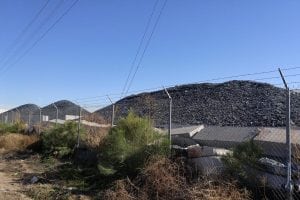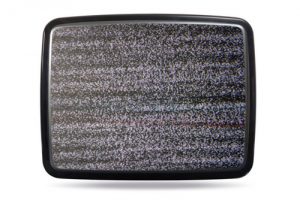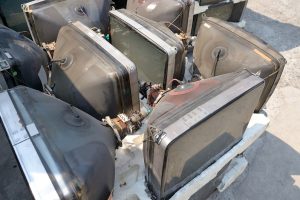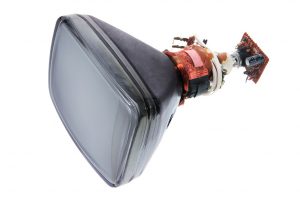
Large piles of CRT glass at Closed Loop’s S 59th Ave. site in Phoenix. Photo from 2016.
Major CRT tonnages left behind by Closed Loop Refining and Recovery sit in warehouses in Arizona and Ohio as regulatory and legal action continues.

Large piles of CRT glass at Closed Loop’s S 59th Ave. site in Phoenix. Photo from 2016.
Major CRT tonnages left behind by Closed Loop Refining and Recovery sit in warehouses in Arizona and Ohio as regulatory and legal action continues.

With the U.S. e-scrap industry continuing to rely on the export market, companies are not only contending with domestic laws and certification requirements – they’re navigating a wide range of complex and unique international laws as well.
 Shuttered CRT processor Nulife Glass continues to wade through a lengthy and costly cleanup of its East Coast operations.
Shuttered CRT processor Nulife Glass continues to wade through a lengthy and costly cleanup of its East Coast operations.

Over the past decade, third-party certification has become an expectation for many processors and refurbishers of electronics.
 John Lingelbach will be leaving his post at the helm of Sustainable Electronics Recycling International (SERI) and the R2 certification program later this year.
John Lingelbach will be leaving his post at the helm of Sustainable Electronics Recycling International (SERI) and the R2 certification program later this year.

Total Reclaim was fined by state regulators for storing flat-panel display devices in trailers on Seattle’s Harbor Island.
No longer receiving material from state electronics recycling programs in Washington and Oregon, processor Total Reclaim is attempting to weather recent regulatory hurdles and set its sights on future growth.
 The second half of 2017 saw e-scrap revenues rise for Sims Recycling Solutions, while profits fell due to European market pressures.
The second half of 2017 saw e-scrap revenues rise for Sims Recycling Solutions, while profits fell due to European market pressures.
 Property owners spent millions of dollars cleaning up CRT storage sites left behind by Creative Recycling Systems. But E-Scrap News has learned much of the glass went to companies that ultimately failed and abandoned stockpiles of their own.
Property owners spent millions of dollars cleaning up CRT storage sites left behind by Creative Recycling Systems. But E-Scrap News has learned much of the glass went to companies that ultimately failed and abandoned stockpiles of their own.
 This story has been updated
This story has been updated
A new waste management plan in the Netherlands has forced Jansen Recycling, a Dutch outlet for U.S. CRT glass, to discontinue accepting material from its suppliers.

Credit: photosync/Shutterstock
For years, India-based electronics manufacturer Videocon has served as a major outlet for recovered CRT glass. But the company now says it is taking in only “limited” tonnages through its closest North American partner, and former suppliers contend that Videocon has ceased production of new CRT devices altogether.

